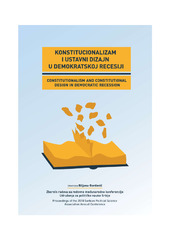Приказ основних података о документу
Empirijsko istraživanje stepena autoritarnosti građana – interpretacije kvantitativnog indikatora
The level of authoritarianism in empirical research – interpretations of the quantitative indicator
| dc.creator | Filipović, Božidar | |
| dc.date.accessioned | 2021-06-17T13:49:37Z | |
| dc.date.available | 2021-06-17T13:49:37Z | |
| dc.date.issued | 2018 | |
| dc.identifier.isbn | 978-86-6425-053-5 | |
| dc.identifier.uri | http://rfasper.fasper.bg.ac.rs/handle/123456789/2962 | |
| dc.description.abstract | Problem validnosti je centralna tema našeg rada. Konkretno, zanima nas merenje nivoa autoritarnosti u empirijskom istraživanju. Želimo da ukažemo na potencijalni doprinos kvalitativnog pristupa ovom problemu. Pažnja je posvećena samo jednom indikatoru: „Bez vođe je svaki narod kao čovek bez glave”. Ovo pitanje je korišćeno u nizu domaćih i međunarodnih istraživanja u poslednjih nekoliko decenija (South-East European S ocial S urvey Project). Ono je početna tačka našeg kvalitativnog istraživanja. Cilj kvalitativnog istraživanja je bolje razumevanje značenja koje ispitanici pridaju navedenoj tvrdnji. Kroz polustrukturisane intervjue došli smo do dubljeg uvida u interpretacije i odgovore na L ikertovoj skali. Iako je kvalitativno istraživanje sprovedeno na relativno malom (kvotnom) uzorku od 20 ispitanika/ca, smatramo da su podaci interesantni i relevantni. R ezultati se javljaju kao izvesna vrsta dopune ili korektiva velike količine kvantitativnih podataka koji su do sada prikupljeni. | |
| dc.description.abstract | The problem of validity is the central theme of our work. In particular, we are interested in measuring the level of authoritarianism in empirical research. We want to point out the potential contribution of a qualitative approach to this problem. Attention is devoted to only one indicator: „Without leaders, every nation(ality) is like a man without a head”. This question has been used in a series of domestic and international research in the last few decades (South- East European S ocial S urvey Project). It is the starting point of our qualitative research. The goal of qualitative research is to better understand the meaning that respondents attach to the above statement. Through semi-structured interviews, we got a deeper insight into the interpretations and answers on the Likert scale. Although the qualitative research was carried out on a relatively small (quota) sample of 20 respondents, we consider the data to be interesting and relevant. The results appear as some kind of supplement or correction of a large amount of quantitative data that have been collected so far. | |
| dc.language | sr | |
| dc.publisher | Udruženje za političke nauke Srbije | |
| dc.publisher | Univerzitet u Beogradu – Fakultet političkih nauka | |
| dc.rights | openAccess | |
| dc.rights.uri | https://creativecommons.org/licenses/by-sa/4.0/ | |
| dc.source | Konstitucionalizam i ustavni dizajn u demokratskoj recesiji | |
| dc.source | Konstitucionalizam I ustavni dizajn u Demokratskoj recesiji/ Constitutionalism and constitutional design in demokratic recession | |
| dc.subject | autoritarnost | |
| dc.subject | validnost | |
| dc.subject | anketa | |
| dc.subject | kvalitativno istraživanje | |
| dc.subject | Authoritarianism | |
| dc.subject | Validity | |
| dc.subject | Questionnaire | |
| dc.subject | Qualitative Research | |
| dc.title | Empirijsko istraživanje stepena autoritarnosti građana – interpretacije kvantitativnog indikatora | sr |
| dc.title | The level of authoritarianism in empirical research – interpretations of the quantitative indicator | |
| dc.type | conferenceObject | |
| dc.rights.license | BY-SA | |
| dc.citation.epage | 269 | |
| dc.citation.other | http://www.upns.rs/sites/default/files/2019-03/Konstitucionalizam%20i%20ustavni%20dizajn%20u%20demok | |
| dc.citation.spage | 253 | |
| dc.identifier.fulltext | http://rfasper.fasper.bg.ac.rs/bitstream/id/8354/pitdbvghgfgf.pdf | |
| dc.identifier.rcub | https://hdl.handle.net/21.15107/rcub_rfasper_2962 | |
| dc.type.version | publishedVersion |


